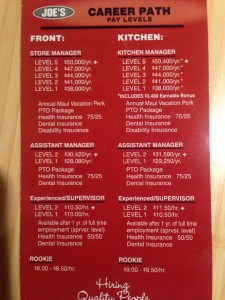Yes, most applicants don’t really want a job — they want a career.
They may not openly confess to their employer that this is what they want. Heck, they may not even admit it to themselves. But while we continue to hear so much political rhetoric about “creating jobs,” what Americans really want is a career.
And there is a monumental difference between a job and a career.
What mindset do you want employees to have?
“When you have a career, there ain’t enough hours in a day. When you have a job, there’s too many hours.” — Chris Rock
What Chris Rock is suggesting is that a job is just something you do for somebody else and you can’t wait for your shift to end. However when you have a career, you throw your heart and soul into it and give it it so much that you completely lose all track of time.
Of the two, which mindset would you rather your employees have?
Look, whatever jobs you’re trying to fill, there’s a path from them to better paying, more stable career positions. The question is, are those paths clearly illuminated so that those who currently have jobs can see their way to career opportunities? And don’t naively assume this is the case.
I’m not suggesting that everyone who fills out an application to join your ranks has designs on becoming the CEO. However, it’s fascinating how many Fortune 1000 CEO’s I’ve met started out in their organization’s in the mail room, or washing dishes, or stocking shelves, etc.
Those leaders started out thinking their job was just a way to earn some pocket money or pay their tuition, but then found a path that led to something greater, and then something beyond that. In most cases, I’ve discovered this wasn’t by accident. Someone they reported to uncovered it for them and gave them the inspiration to reach higher and be the very best at whatever job they held at the time.
A classic best practice example
One of my favorite eateries in Colorado is Tokyo Joe’s. The company is a local chain of 24 fast casual restaurants created by CEO Larry Leith, and they are a drastic departure from their competitors in many ways. Aside from their wonderful “healthy-fast Japanese” food, I love the way Larry illuminates the path from job-to-career with Tokyo Joe’s, and how he boldly shares it with the world.
 Every table at Tokyo Joe’s features a flip-style sign detailing menu items, specials, etc. One of the cards in the rotation is this one that highlights the career path from a “Rookie” (hourly crew member) to a Store Manager or Kitchen Manager at Tokyo Joe’s.
Every table at Tokyo Joe’s features a flip-style sign detailing menu items, specials, etc. One of the cards in the rotation is this one that highlights the career path from a “Rookie” (hourly crew member) to a Store Manager or Kitchen Manager at Tokyo Joe’s.
It’s bold, clear, and concise. Employees can set their sights on where they want to be, and work towards that goal knowing what rewards await them. There’s no mystery or detective work that needs to be done.
And that is the kind of transparency and openness that the emerging workforce truly values. How much more engaged and committed would your workforce be if they saw their job as a path to a bigger, better paying career, or at least, that their job had the potential to become a career?
If you haven’t already done so, maybe it’s time to illuminate that path.
This was originally published on Eric Chester’s Reviving Work Ethic blog. His new book is Reviving Work Ethic: A Leader’s Guide to Ending Entitlement and Restoring Pride in the Emerging Workforce. For copies, visit revivingworkethic.com.
